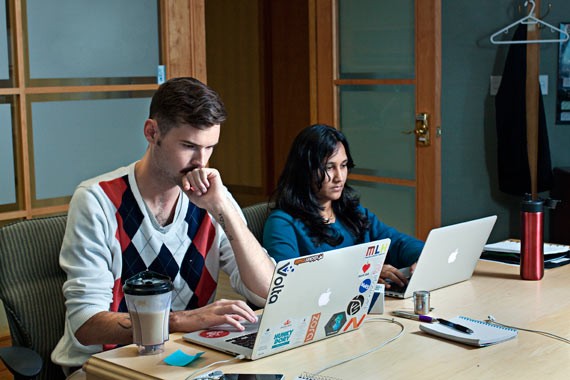It’s Monday morning and despite the fervour of beeping traffic on Barrington Street, up above, inside Volta Labs, you can hear a pin drop. The space looks empty and devoid of any life, but looks can be deceiving.
“Hey, sorry if you were waiting,” says public relations manager Jill Shea. “We’re all in our own little startup bubble today.”
Volta has an open-door policy, graciously inviting any and all into its maze of consistent innovation. Exhibiting a retro-futurism, framed motivational posters hang scattered on the workspace’s walls and a milky way mural spans the whole right side of the lab. You feel you’re in a different galaxy now, and perhaps that’s the point.
A non-profit startup house, Volta occupies two floors in the towering Maritime Centre at the bottom of Spring Garden Road. It offers a space for entrepreneurs to foster, build and create. Despite the quiet, Shea assures me that it’s a hectic day at the office. Some entrepreneurs are rushing to meetings with potential investors, others are at conferences in Las Vegas and most are curled over their computer screens coding.
What the hell classifies a startup entrepreneur? A few stereotypes spring to mind, most irritatingly a Silicon Valley type, donning geek chic and fresh-from-the-dorm attire while pocketing millions of dollars a year from one winning idea. In some cases that’s dead on, but for the majority of Halifax’s startup entrepreneurs there are more complexities, struggle, failure, risk and loneliness lying beneath the glossy surface synonymous with this trending brand of business ventures. This isn’t a nine-to-five job for anyone involved. Instead, you’ve gotta be a hustler.
“This lifestyle isn’t as glamourous as everyone seems to think,” says Shea, “and you can’t just clock out.”
According to an entrepreneur poll conducted by RBC in July, Atlantic Canada leads the nation with 93 percent of people expressing a desire to employ themselves. Excuse the industry parlance, but that means we’re pretty on brand when it comes to the global surge in startups happening in bigger cities. The issue, however, is only 36 percent of Atlantic Canadians (according to RBC) ever take the plunge, for fear of failure or not knowing where to start. There’s also the harsh reality that these entrepreneurs want to do business in Nova Scotia, which isn’t exactly Palo Alto. All the other benefits and drawbacks aside, a place like Halifax is a medium-size city in a small province tucked away up in some off-track corner of the continent. Far from seeing that as a burden, Halifax’s startup ecosystem is embracing its community in an attempt to make the entrepreneurial void a little less lonely.
Just months after expanding to the larger office space in the Maritime Centre, Volta is again at capacity, with 11 companies renting private work offices and another waiting list already taken form. It also has over 350 registered drop-in members who come and go as they please, utilizing the communal spaces around the office. In the two years it’s been open, Volta has welcomed and bid farewell to 36 startup companies. It is, you could say, the centre of a startup culture in Halifax that’s not showing any signs of slowing down. Instead, it’s craving for recognition.
“There’s no doubt we need to grow the startup scene,” says Shea, “but I think people don’t initially look to us as a startup community, but we want to show that they should because we can have great startups coming out of this province.”
Founder and CEO of Vendeve, Katelyn Bourgoin is a current resident at Volta and her company just hit its first birthday. Vendeve is an online community that encourages female entrepreneurs to start and scale businesses by giving them a marketplace to buy and sell skills. The company, run by five women, has in a single year attracted close to 3,000 members from 42 countries and raised $350,000 in seed money. If the pink diamond-encrusted chalice that reads “BOSS” on top of Bourgoin’s desk isn’t enough to tell you, these ladies like to see shit get done. But entering into entrepreneurship was no skip in the park.
“In startup world, ideas are worthless,” Bourgoin says. “No one cares about your 40-page business plan or careful market research. You have to build something from nothing and prove that it works before anyone will pay attention. It’s a long, hard, sometimes soul-crushing slog that many companies don’t make it out of alive.”
Sarah MacLeod, content editor for Vendeve, says a space like Volta where startup teams can swap skills has been integral to the company’s success. MacLeod says she was drawn to the startup industry because of a lack of traditional jobs available to young people. She’s not alone.
Vendeve is just one of many companies that were born, fostered and scaled here in the Maritimes over the last few years. TitanFile, a digital file sharing company founded by former Volta executive director Milan Vrekic, sold to Xerox Canada back in 2012. GoInstant, a web-browsing firm, was bought by SalesForce for a reported $70 million, while Fredericton’s Radian6 was also bought by SalesForce for $326 million. Then there’s Dash Hudson.
A marketing platform and one-click shop, Dash Hudson is leading the pack in monetizing Instagram by letting users shop for the items featured in their favourite photos. The company recently raised $1 million in seed round funding, including investment from GoInstant’s founders Jevon MacDonald and Gavin Uhma. The company has an office of six in Halifax, with two employees in New York. Though co-founder Thomas Rankin prides himself on reaching global clientele, he’s also excited about the young startup community in Halifax that’s attracting a deep roster of talent.
“Most of our team has come from local masters programs here,” says Rankin. “They pump out really smart and talented people. That’s most important—finding the top-quality people, and on the talent side, you can build a great team here.”
Though only two years old, Dash Hudson was one of the first to set up at Volta’s previous location on Spring Garden Road. The founders—Rankin and Tomek Niewiarowski—credit their year at Volta with helping them raise first-term financing, and also gain the necessary support to keep going. That’s important, because running a startup isn’t easy. Even with the help of peers, there’s no road map to success.
“Literally, you’re always wrong,” Rankin says. “You’re dead wrong. We don’t even call it failure. Think of it as doing math problems every week, and you got every one wrong.”
Rankin now sits on Volta’s board, as a way to give back to the system that supported him. Halifax’s small community, he says, makes it easier to build strong, sustainable relationships within the startup industry.
Which is to say, despite all the “solopreneurs,” this startup game is a team sport—and when it comes to challenges, Allyson England says it’s a marathon, not a sprint.
“Some people think all it takes is one great idea and it kicks off,” she says. “You see at Volta posters that say ‘failure is part of the process,’ and it is with any career. If you never want to fail, don’t do anything. What you’re not seeing is all that struggle along the way.”
England is director of operations for The Rounds, which operates a secure social network to connect medical professionals. A graduate of Volta, the doctors-only The Rounds is just two years old with nearly 1,500 15,000 physicians on board, and is now Canada’s largest professional network exclusively for physicians. In April 2014, the company announced it completed a $1 million seed capital fundraising effort, with $250,000 investment from Innovacorp and a host of angel investors.
That success is all above the surface, though. What’s missing from the glorifying media portrayals of startup success stories are the toils and labour to reach that stage. Struggle is synonymous with the job.
“Being a startup CEO is kind of like being a contortionist,” says Katelyn Bourgoin. “You’re constantly reshaping yourself to meet the next challenge. But of all the skills you need to succeed, most of all you need a thick skin, a clear mission and people who support you.”
“You do have to have a high degree of confidence,” adds Thomas Rankin. “But more so it’s about tricking yourself. It comes from a place of insecurity, really. The things you get wrong, you have to move past it and it’s not an overconfidence thing, but it’s the knowledge that you will fail, but you will also keep moving forward.”
The positive thinking is necessary, since the life of an entrepreneur can be an unending, daily buffet of failures that takes its psychological toll. The risk of sacrificing pension and a decent paycheque for months—if not years—may leave one anxiety ridden. Remembering that you have friends fighting the same fight helps release some of that weight.
What else could help? Well, Allyson England, for one, wants a more supportive attitude from her fellow Nova Scotians.
“There’s definitely a lot of alarm and excitement surrounding this idea of startup culture,” she says. “But what I’d like to see from this is acceptance and encouragement and having Atlantic Canadians supportive of the idea of creating your own business, whether it’s for economic prosperity or job prosperity. I think it’s important for everyone.”
Increasingly, anyone who wants to stay and work in the Maritimes will have to go it alone. Many are stepping up to become their own bosses, which is one surefire way to never be short on work.
Last week, Volta brought some of those entrepreneurs together via Startup Empire—a sold-out conference where attendees heard and learned from some of the greats in the industry. Real talk: It’s where folks in the startup world could run through their woes, verbally high-five their successes and get inspired to keep growing their companies.
It goes without saying, what we have in Halifax is a culture of collaboration. The startup scene here seeks to propel its innovation and talents—to fundamentally rise up against global competitors. That’s not an easy challenge. There may not be an exact formula to establishing success in the startup industry, but it does undoubtably crave a unification of support and mentorship along the way.
On a Monday, just past 5pm, Volta is still brimming with exhausted minds, toiling over the day’s work. Mornings have a way of morphing into evenings, and slowly seeping into the wee hours of the next day.
Today, these entrepreneurs could have failed, succeeded or both, a dozen times over. But there’s always someone just over your shoulder, around the corner of that maze, fighting the same fight. You’re going to fail, but that’s OK. No matter, as Samuel Beckett wrote. “Try again. Fail again. Fail better.”
Michelle Cameron is a freelance writer and entrepreneur, if you count spilling red wine as a startup business.



